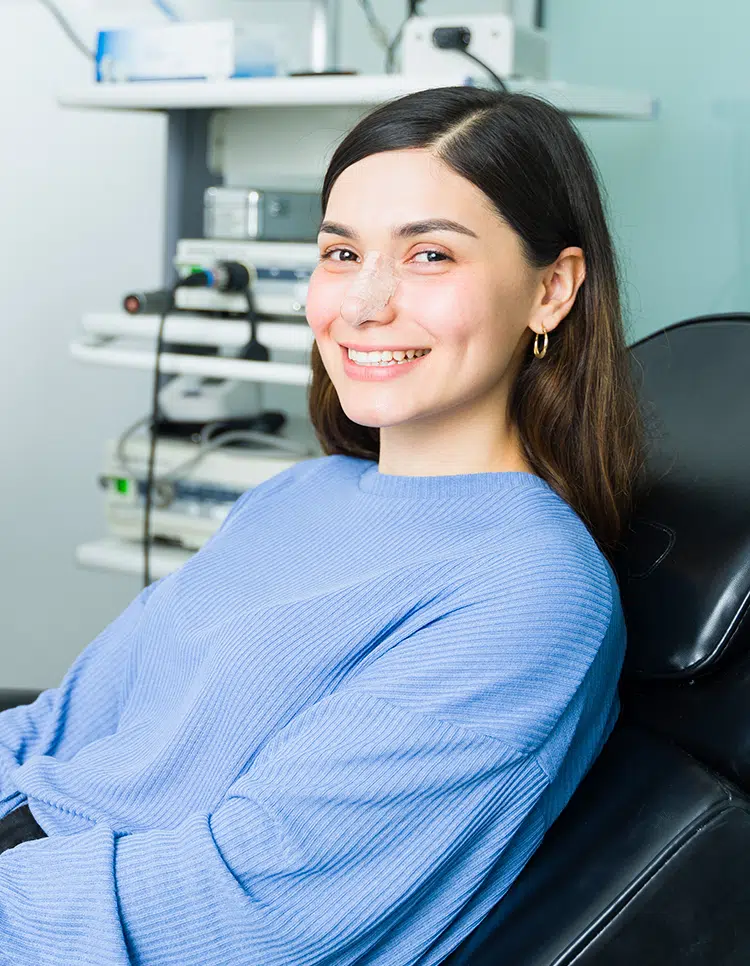
Deviated Septum
A deviated septum is a common condition that can significantly impact your quality of life. At Penn Medicine Becker ENT & Allergy in Philadelphia, PA, our team of experienced ENT specialists is dedicated to providing comprehensive care to address this issue. Whether you have trouble breathing, nasal congestion, or disruptive snoring, understanding and treating a deviated septum can improve your daily comfort and long-term health.
What Is a Deviated Septum?
The nasal septum is the thin wall of cartilage and bone that divides your nasal cavity into two nostrils. Ideally, this septum is positioned in the center, allowing for equal airflow through both nasal passages. However, when the septum is displaced to one side, it is known as a deviated septum. This misalignment can make one nasal passage significantly smaller than the other, potentially leading to breathing difficulties, congestion, and a range of associated symptoms.
While many people have some degree of septal deviation, the condition is only problematic if it obstructs airflow or contributes to chronic symptoms. When severe, a deviated septum may benefit from intervention, including medication or surgery, to restore proper nasal function.

Causes of a Deviated Septum
A deviated septum can be caused by various factors, including:

Symptoms of a Deviated Septum
While many people have a mildly deviated septum without noticeable issues, a significant deviation can lead to various symptoms, including:
If these symptoms interfere with your daily life, seeking professional evaluation is crucial. Our specialists at Penn Medicine Becker ENT & Allergy can help determine the best course of action for relief.



Benefits of Treatment
Treating a deviated septum can lead to numerous benefits, including:
Treatment Options for a Deviated Septum
The appropriate treatment for a deviated septum depends on the severity of the condition and the impact on your quality of life. Treatment options include:
Non-Surgical Treatments
For mild cases, symptoms can often be managed with:
- Decongestants: Medications that reduce nasal swelling, allowing for improved airflow.
- Nasal Steroid Sprays: These help reduce inflammation and open nasal passages.
- Antihistamines: Useful for individuals with allergies that contribute to nasal congestion.
- Nasal Strips: These can temporarily improve airflow by physically widening the nostrils.
While these treatments may provide temporary relief, they may have side effects that need to be monitored, and do not correct the underlying structural issue.
Septoplasty: The Surgical Solution
For individuals with significant nasal obstruction, septoplasty is the most effective treatment. This outpatient surgical procedure involves:
- Anesthesia Administration: Septoplasty is typically performed under general anesthesia, ensuring the patient remains comfortable and pain-free during the procedure.
- Incision Inside the Nose: The surgeon makes a small incision inside the nostril to access the septum. Because the incision is internal, there are no visible scars.
- Repositioning of the Septum: The surgeon carefully reshapes or removes the deviated portions of the septum, straightening it to allow for improved airflow.
- Stabilization: Small splints or sutures may be placed inside the nose to keep the septum in the correct position as it heals.
- Closure of the Incision: The nasal tissue is repositioned, and dissolvable sutures are used to close the incision.
- Recovery Process: Patients can usually return home the same day but should expect mild swelling and congestion during the initial healing period.
Candidates for Treatment
You may be a candidate for treatment if you experience:
A consultation with our specialists can help determine the most appropriate treatment plan for you.
The Consultation Process
During your consultation, our ENT specialists will:
Choosing a Specialist
Selecting an experienced ENT specialist is essential for effective treatment. At Penn Medicine Becker ENT & Allergy, our board-certified physicians specialize in advanced nasal procedures, ensuring safe and successful outcomes. Our specialists have extensive experience performing septoplasty and utilize the latest techniques to minimize discomfort and recovery time. By choosing a skilled specialist, patients can feel confident that they are receiving the highest level of care.
Septoplasty Recovery and Post-Operative Care
Recovery Timeline
Patients may experience nasal congestion, mild bleeding, and swelling. Pain is usually manageable with prescribed or over-the-counter pain medication. Rest is essential during this period.
First 24-48 Hours
Swelling begins to subside, but nasal congestion may persist. Patients should avoid heavy lifting, strenuous exercise, and blowing their nose. Follow-up appointments will be scheduled to monitor healing.
First Week
Most patients can return to work and light daily activities. Swelling continues to diminish, and breathing improvements become more noticeable.
Weeks 2-3
The majority of swelling resolves, and nasal airflow is significantly improved. Normal physical activity can typically resume.
Weeks 4-6
Complete healing occurs, with final results visible. Patients enjoy long-term benefits, including easier breathing and reduced sinus issues.
Months 3-6
Post-Operative Care Tips
Saline Nasal Spray and/or saline washes
Helps keep nasal passages moist and clear of debris.
Avoid Irritants
Smoke, dust, and strong odors should be avoided during early recovery.
Sleep with Head Elevated
Reduces swelling and promotes drainage.
Follow All Post-Operative Instructions
Compliance with care recommendations ensures a smooth recovery.
Locations in Philadelphia, PA
We provide comprehensive ENT services at multiple locations in Philadelphia, including Walnut Street and South Street.
Penn Medicine Becker ENT & Allergy
1608 Walnut St Suite 902
Philadelphia, PA 19103
Phone: (215) 929-8301
Penn Medicine Becker ENT & Allergy
1740 South St Suite 401
Philadelphia, PA 19146
Phone: (215) 671-6330
Frequently Asked Questions About Deviated Septum
If you’re struggling with symptoms of a deviated septum, contact Penn Medicine Becker ENT & Allergy to schedule a consultation today.


